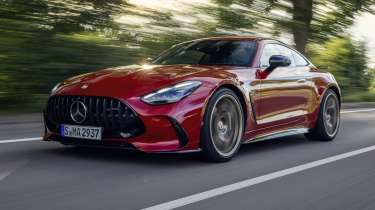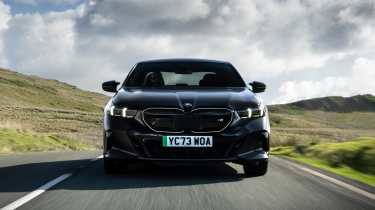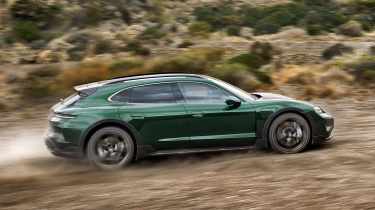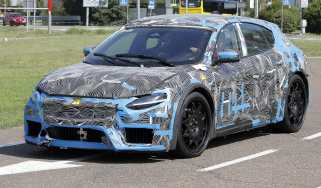Will the combustion engine really be dead by 2035?
Legislation will force ICE cars off the market in the coming years, but could they exist in some capacity into the next decade? The evo team weighs in
The question of what lies ahead for the internal combustion engine remains up in the air. Legislators appear to be insistent on ringing the death knell for ICE, yet some key figures and commentators within the automotive industry acknowledge that, for the consumer, something other than an outright ban may be required.
In episode two of the evo podcast, Editor-in-Chief Stuart Gallagher and Deputy Editor James Taylor joined Editors-at-Large Dickie Meaden and John Barker in discussing what may lie ahead for the petrol-powered motorcar.
The podcast opens with talk of the latest wave of ICE exotica, which indicates that demand for high-revving, multi-cylinder engines is as strong as ever, and that the pages of evo won’t suddenly fall silent in 2030.
But it’s the apparent reality that EVs as they are won’t age into the cars the masses have always depended on – cars that last for decades, depreciate linearly and are relatively cheap and easy to buy and maintain for the not-so-well-off – that seems to make the widespread death of ICE all but inconceivable.
Stuart Gallagher: ‘The internal combustion engine. Everyone’s been talking about it dying, that it has no future, for what now seems a very long time. But this year Porsche has designed and developed a new flat-six with a hybrid element, Lamborghini has launched a new V12 and V8 hybrid, we have Mate Rimac commissioning a V16 engine by Cosworth and Gordon Murray with his Cosworth V12.
‘Do we think the death of the internal combustion engine has been slightly exaggerated? Manufacturers seem to be still designing, developing and planning for ICE engines going forward.’
John Barker: ‘Legislation is coming, 2030’s back on the agenda again. The Germans and Italians seem to be hedging their bets by having hybridisation of the regular cars. That at least gives them a stay of execution. There’s no point designing a purely ICE car, there’s no point in investing, so hybridise it. It’s the same with a car I drove recently, the Mercedes-AMG GT E Performance.’

Dickie Meaden: ‘The hybrids are billed as a stop-gap but you sense subtle signals that CEOs and engineers aren’t as vehement on the route towards EV. If you commit to EV-only, which a number of manufacturers have, I suspect behind closed doors they’re probably a bit edgy at the moment.’
John Barker: ‘There’s already talk about allowing sustainable non-fossil fuels, how you legislate that I have no idea. But as you say, there’s a rolling back on the absolute ‘no ICE engine’ commitment. Certain manufacturers haven’t committed – Toyota, Ferrari.’
James Taylor: ‘Recently Ferrari unveiled a new e-building, a big new extension to the factory, that allows them to build cars with all three main types of powertrain, from pure ICE, through hybrid to pure EV.
‘Obviously, Ferrari has the luxury of doing that because of the way their company is but you really get the sense that they and everyone else are having to hedge their bets. No one’s quite sure what the landscape’s going to be and from an engineering point of view, the right way to approach it surely is to not go down one route.’
Dickie Meaden: ‘You feel sorry for the manufacturers because they’re caught between a rock and a hard place. They’re told at a government level you have to do this, but they build cars for people to buy and currently, people are deciding they don’t want to buy EVs. Maybe it’s incentives, maybe they’re uncertain about values.
‘It’s just an unknown quantity but manufacturers have to plan. It amazes me how responsive car companies are in how they pivot and produce possibly the most complex thing we interact with on a daily basis and we just expect it to work and it has to be safe. But no one really knows what’s going to happen, do they?’

Stuart Gallagher: ‘It’s fascinating how they’ve approached it. Some have gone all in on EV, some have been very clear about ‘here’s our ICE range, here’s our EV range’. Then there’s BMW, who haven’t backed themselves into a corner with a new 5 Series that can be EV, ICE, hybrid and hydrogen. They have that flexibility. You do wonder if there’s enough demand for those who have gone all in on EV.’
Dickie Meaden: ‘You do get asked ‘what do you think of EVs, should I get one’ and that conversation has changed in the last few months. Rather than ‘the infrastructure’s not there’, the conversation is more nuanced. It’s more ‘is it going to work for me, what’s it going to be worth, am I going to be stuck with something I can’t get rid of?’. You do hear anecdotally that dealers won’t take EVs as trade-ins because they don’t know what they’re worth. It’s such a mess, of no one’s making really, other than legislation that’s being forced on everyone, that isn’t necessarily correct.’
Stuart Gallagher: ‘The industry’s been good at addressing the infrastructure challenge. You see pockets of chargers and you see however many thousands being opened every year. But there will always be another challenge and the one we’re seeing at the moment seems to be the residual values of used EVs. For example the Taycan, which is a brilliant car and still a really good EV, but the market isn’t interested.’
Dickie Meaden: ‘It’s pretty hard, can you imagine being in sales in a Porsche dealership – and generally theirs are customers of many years – thinking ‘should I sell them this thing?’. There are no advantages as a used car – tax breaks – and they don’t have the advantages of the new ones. They’ve become more like mobile phones. Would you rather just flip into your next tariff and get a new phone, or save some money and have one where the battery is half knackered and doesn’t have some of the new functions?’

John Barker: ‘It doesn’t all have to be EV. That’s why these companies like Ferrari and Toyota are hedging their bets. It’s not a one size fits all solution. What do we do about trucks and aeroplanes? You talk to people like Zero Petroleum and yeah, they’re looking at cars but the big prize is aero.’
Stuart Gallagher: ‘The private buyer is always the one that’s going to be penalised by being told by someone else saying ‘you have to have this’.’
Dickie Meaden: ‘At some stage we’re just going to end up paying more and more. It’s interesting, yes we can point to this V12 and that V8 and that’s fine. The people that can afford them would pay £50 a gallon if they wanted to. The hardest thing now is the people that can just about afford to run a car, where do those people fit in? For a lot of people cars are just how you get to work, get the kids to school, get their food. That’s where the legislation is wrong and where it doesn’t meet in the middle somehow.’
Stuart Gallagher: ‘You look at the price point and what’s affordable for your first car and how you get by. You’re not going to get a £20-£30k EV. Cheap EVs are in the minority – the cheapest VW Group EV is in the high 20s. You’ve got to start somewhere.’
Dickie Meaden: ‘Inevitably there’s the thought an affordable EV won’t have range, won’t have this, won’t have that, whereas you can buy a £500 Focus and drive around the world if you want, and anyone can fix it. It’s a massive conundrum.’



